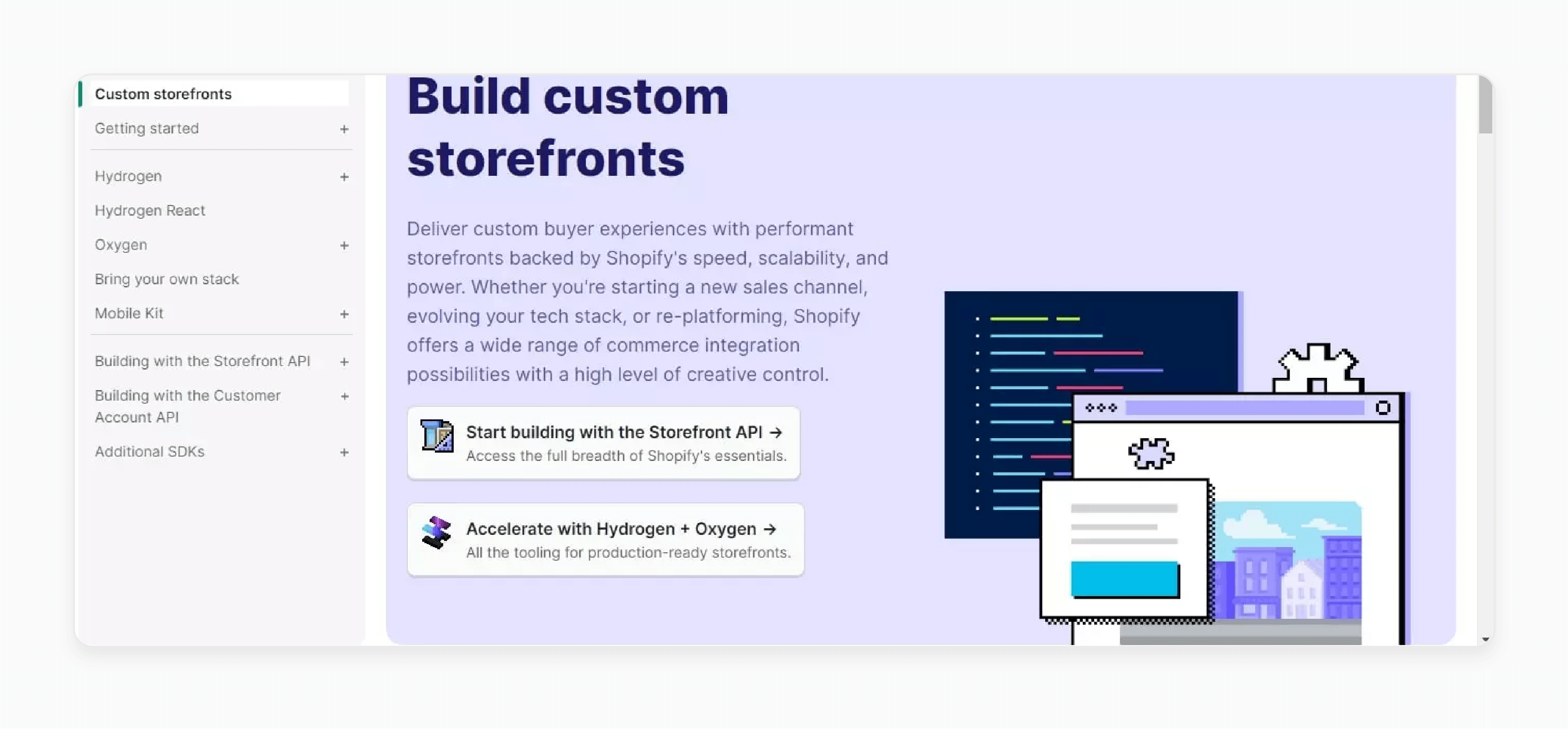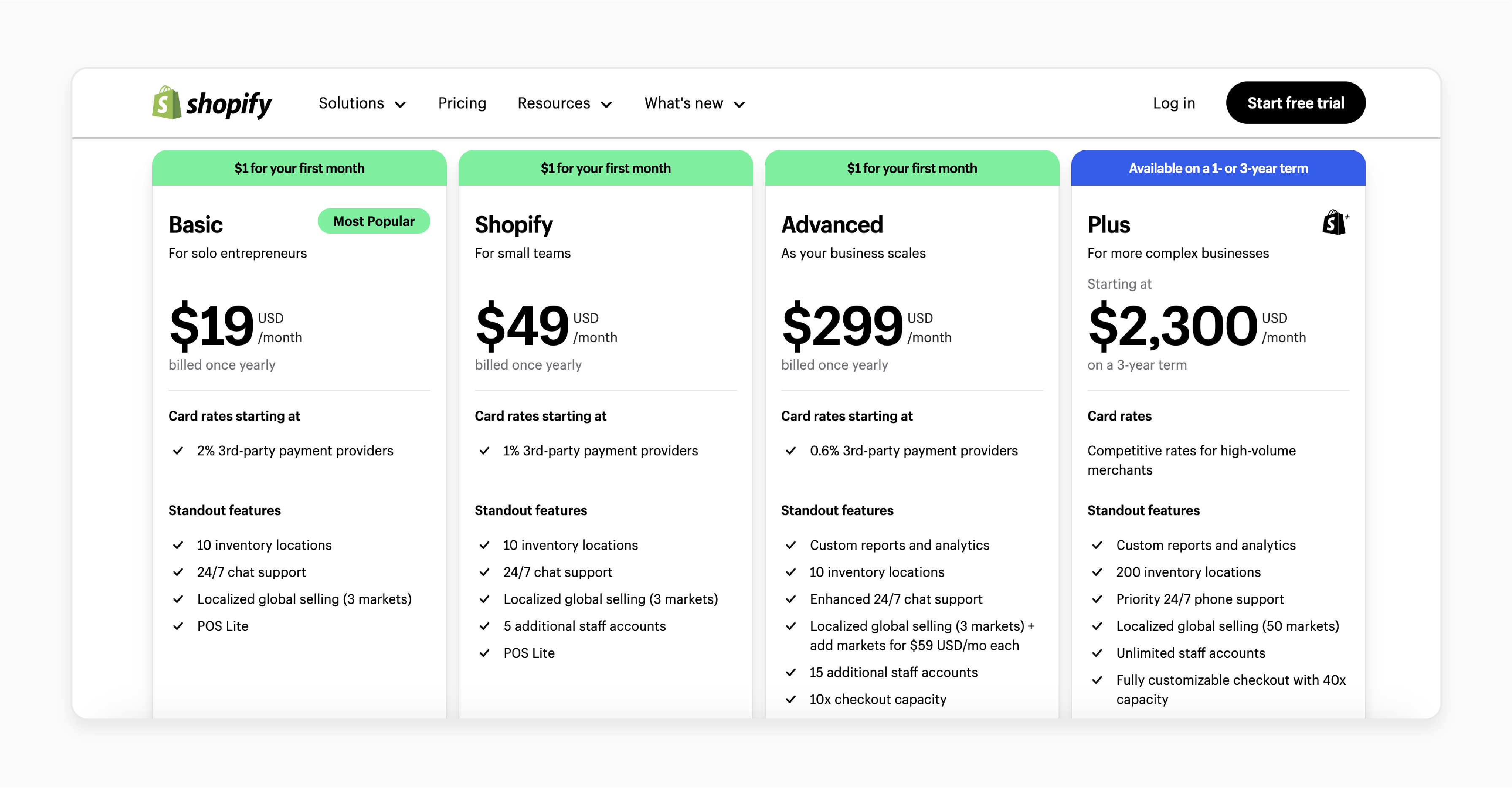
Shopify vs Magento Coalition: Which Ecommerce Platform is Better?
Are you searching for the best e-commerce platform for your business? Shopify vs Magento Coalition comes down to your specific needs. Shopify is easy to use and great for quick setups. Magento Coalition technologies offer advanced features and customization.
This article will cover the differences between the Shopify and Magento coalition.
Key Takeaways
-
What are the aspects of Shopify and Magento Coalition?
-
Various key features of both Shopify and Magento Coalition.
-
Comparison of Shopify vs Magento to find the best platform for e-commerce business.
-
Advantages and disadvantages of both the ecommerce platform while making website integrations.
-
Pricing and transaction fees for Shopify and Magento coalition.
-
Comparison of the extensions and apps on the Shopify App Store and Magento’s store.
-
What is Magento Coalition: An Advanced and Scalable Platform
-
Differences between Shopify and Magento Coalition: Customization Options
What is Shopify: A Simple and User-Friendly Platform
Shopify is a leading e-commerce platform. It makes setting up and managing an online store simple for its users.
Shopify stands out for its user-friendly design and wide range of customization options. Unlike Magento, which needs more setup and upkeep. It is known for its ease of use and ability to scale, making it a good choice for both small and large businesses.
Plans like Shopify Plus suit different business needs. Whether comparing Shopify vs Magento or looking at Shopify and BigCommerce. Shopify's easy-to-use interface and drag-and-drop features allow anyone to start selling online.
What is Magento Coalition: An Advanced and Scalable Platform
Magento Coalition is an enhanced and open-source e-commerce platform. It lets users create and manage e-commerce stores.
Magento Coalition provides extensive customization options, which are not always available on Shopify. It supports complex needs like payment gateway integration and detailed inventory management.
Choosing Magento means getting a flexible e-commerce platform. It is a popular choice for large businesses and enterprises. The features are relevant because of their scalability and advanced features. Magento Coalition offers two main versions:
-
Magento Commerce: It is the paid version with advanced features for larger businesses.
-
Magento Community Edition: It is free and suitable for smaller e-commerce businesses.
3 Key Features of Shopify in Ecommerce
1. Store Design and Customization Features
Custom Storefronts

-
Shopify lets users create Magento storefronts that offer a smooth shopping experience. The platform’s speed and scalability make this easy. Whether users are:
-
Starting a new sales channel
-
Upgrading their tech
-
Switching from Magento.
-
-
Shopify provides many commerce integration options. It gives a lot of creative control. The storefront Magento API helps build unique shopping experiences. Users can use Shopify’s commerce API layer to add features like:
-
Contextual pricing
-
Subscriptions
-
Optimized cart.
-
Theme Customization Options

-
After selecting a theme for the ecommerce store, use the theme editor in Shopify to match it with the brand. The Magento 2 theme editor previews the theme.
-
It changes the settings and easily adds, removes, modifies, or rearranges content. To make customization easier, Shopify merchants should:
-
Create a duplicate of the theme as a backup. It can revert to the original if needed.
-
Understand the available support options and what help they offer.
-
Follow best practices for uploading images.
-
2. Product Management Features
Pre-orders

-
Shopify’s preorder feature offers products that are out of stock or not yet available. It helps users gauge interest in new products and build excitement. Depending on the settings, customers can make:
-
Full payment
-
No payment when placing their order.
-
-
By collecting payments, merchants can securely store customer details. It allows retailers to fulfill the order and collect any remaining payments later.
Inventory Management Tools
-
Inventory means the amount of a product available for sale. To avoid selling items that are out of stock and when to restock, inventory tracking is important. On Shopify, users can easily manage Magento inventory management by setting up:
-
Tracking
-
Checking stock levels
-
Adjusting quantities as needed.
-
-
Managing inventory levels involves manual adjustments. It is due to changes in product popularity, Magento 2 sales and seasonality.
Product Catalog
-
The Product Catalog feature in Shopify allows one to manage all the products in one place. Retailers can add, edit, or customize product listings to represent the store’s inventory. Retailers can provide:
-
Detailed product descriptions
-
Titles
-
Prices
-
Variants
-
-
Images for a more authentic visual presentation. The feature lets users tag products and organize them into collections or categories.
-
It makes customers find what they are looking for. The Magento 2 product catalog management improves the shopping experience.
3. Marketing and Sales Features
Shop Chat

-
Engage with the customers through the Shop app. With the Shopify chat feature, retailers can easily communicate with customers. It helps enhance their shopping experience and boost Magento conversion rates.
-
Customers can start a chat with the store at any time, even if they do not make a purchase yet. To enable the feature, make sure to use the Shop Channel and have Shopify Inbox set up.
Email Marketing Tools
-
Email Marketing Shopify offers tools to help reach more customers and grow business. Retailers can write newsletters for customers who sign up for the mailing list. They can keep customers updated on new products and upcoming deals.
-
With Shopify's email marketing tools, merchants can:
-
Create
-
Design
-
Send out email campaigns directly from the platform.
-
-
It is a great way to share information about the Magento website and brand messages. It also links directly to Magento 2 e-commerce products.
-
Merchants using Basic Shopify, Shopify, Advanced Shopify, or Shopify Plus plans can access these tools.
-
Pricing is based on the number of emails merchants send. For example, sending an email to 800 subscribers counts as 800 emails.
7 Key Features of Magento Coalition in Ecommerce
1. Open-Source and Flexibility
Magento Coalition is an open-source platform that provides great customization and flexibility. For instance, Nike uses Magento to customize the online store to their specific needs. It demonstrates how Magento is an open-source solution that supports various business requirements.
2. Scalable Architecture
Scalable architecture in Magento means it can handle high traffic and large shared product catalogs. For example, Samsung relies on Magento to manage its extensive product range. The heavy website traffic shows how Magento vs Shopify favors large enterprises.
3. Flexible Content Management
Magento’s content management system (CMS) allows easy handling of different content types. For example, Cleveland Clinic uses Magento to update health-related blogs and service descriptions. It illustrates why Magento offers enhanced content management. Flexible management of content is important when choosing the right ecommerce for business.
4. Strong Security Features
Magento includes advanced security features like CAPTCHA and PCI Data Security. Adobe Commerce, built on Magento, ensures customer payment details are secure. It is an important factor in comparing Magento vs Shopify. Security is important for protecting customer information.
5. Design and Development
Magento allows for conversion-optimized user experience and unique branding. For example, HP uses Magento to create a custom online store that reflects its brand. It shows why Magento is the best choice for using personalized strategies for ecommerce. It is best, especially when choosing the right ecommerce platform for your businesses.
6. Mobile-Friendly
Magento offers a responsive design that works well on all devices. For example, fashion brands use Magento to provide a smooth shopping experience. The experiences are provided on desktops, smartphones, and tablets. It highlights how Magento and Shopify compare in delivering a consistent mobile experience.
7. Multi-Store Management
Magento Coalition lets retailers manage multiple online stores from a single dashboard. For example, Coca-Cola uses Magento to run various regional stores in one place. It demonstrates the effectiveness of Magento’s multi-store management feature.
Differences between Shopify and Magento Coalition: Customization Options
| Customization Option | Shopify | Magento Coalition |
|---|---|---|
| Platform Type | Shopify is a hosted platform managing technical details for you. | Magento is an open-source platform or Magento enterprise (Magento Commerce). It needs more technical work. |
| Inventory Management | Simple inventory tracking with basic features. | Advanced inventory management for large catalogs and detailed tracking. |
| Theme Customization | Shopify themes use a drag-and-drop editor. Custom changes need Liquid. | Magento offers more detailed customization through its templating system. |
| Multi-store Management | Limited multi-store features; may need separate accounts or apps. | Adobe Commerce allows managing multiple stores from one Magento dashboard. |
| Extensions and Integrations | Shopify has many apps for common tools, but may be limited for specialized needs. | Magento provides a wide range of extensions for complex needs. |
| B2B Features | Basic B2B features through apps; more customization may be needed. | Magento has strong B2B features, like quoting and company accounts, suited for large businesses. |
| Content Management | Basic CMS for managing pages, blogs, and product descriptions. | Magento has strong B2B features, like quoting and company accounts. It is suited for large businesses. |
| Pre-order Functionality | Built-in pre-order options with customizable payment methods. | Magento does not include pre-order features by default. It needs extensions or custom work. |
Shopify vs Magento Coalition: Quick Comparison
| Attributes | Shopify | Magento Coalition |
|---|---|---|
| Launched in | 2006 | 2008 |
| Solution Type | Hosted Solution | Open Source (Community Edition of Magento) |
| User Community | Excellent support with quick issue resolution. | Large community with good support. |
| Web Hosting included | Yes | No |
| SEO | Built-in SEO Services | Strong SEO capabilities |
| Unlimited Bandwidth | Yes | No |
| Cost | Monthly subscription fees. | Open-source (free), but requires hosting and Magento maintenance. |
| No-code Store Development | Yes | No |
| Customer Support | 24/7 customer support. | Community support with paid enterprise options. |
| Pros | - Multi-channel selling (social media, Amazon, eBay). - Extensive app range. - 70+ themes (10 free, others from $140. |
- Large community. - Highly customizable. - Ideal for enterprise ecommerce businesses. - Compare Magento vs Shopify to see Magento's customization edge. |
| Mobile App for eStore Owners | Yes | No |
| Number of Apps/Extensions | 6000+ | 4000+ |
| Suitable for | Beginners, small-scale to medium businesses. | Intermediate to advanced, small to large businesses |
Shopify: Advantages and Disadvantages
Advantages
-
Easy to set up and user-friendly: Shopify is the best for beginners. It helps you start with Shopify quickly.
-
Easy app integration: Shopify makes it simple to add new features to apps. It is easier than with Magento and BigCommerce.
-
Built-in SEO tools: Shopify is an ecommerce platform with SEO tools. It helps ecommerce websites rank better.
-
Mobile app for store management: Shopify offers various features in its mobile app. Users can manage the Shopify store from anywhere.
Disadvantages
-
Limited customization: Shopify over Magento can limit how you customize your store. It can be a problem if you use a complex headless setup.
-
Pre-built themes may restrict personalization: Shopify plan comes with themes. It might allow little personalization.
-
Recurring monthly fees and extra costs: Shopify payments involve monthly fees. You may also face extra costs for apps and services.
Magento Coalition: Advantages and Disadvantages
Advantages
-
Open-source and transparent: Magento Commerce or Adobe Commerce is a leading ecommerce platform. It gives full control over the Magento store.
-
Built-in multilingual support: Magento and BigCommerce offer tools for multiple languages. It helps reach customers around the world.
-
Easy API integration: Magento’s flexible design makes it easy for developers to add new APIs. It makes it a powerful ecommerce platform for custom features.
-
Great for B2B operations: Magento enterprise solutions support advanced B2B features. It is for businesses with complex needs.
-
High scalability: Magento Commerce or Adobe Commerce can manage products and traffic. It makes it suitable for growing businesses.
Disadvantages
-
Hosting is extra: Magento requires separate hosting. Magento Commerce Cloud, which starts at $40,000/year, includes hosting.
-
Needs a developer: To use Magento, users need a developer for complex customizations.
-
Technical skills needed: Magento blog and other resources set up and customize store. It requires some technical knowledge.
Pricing Plans Comparison: Shopify vs Magento Coalition
Shopify Pricing Plans

1. Basic Plan (Most Popular-For solo entrepreneurs)
-
Monthly Subscription Price: ₹1,994 INR
-
First Month: ₹20
-
Card Rates Starting At: 2% with third-party payment providers.
Standout Features:
-
10 inventory locations
-
24/7 chat support
-
Localized global selling (3 markets)
2. Shopify Plan (For Small Teams)
-
Monthly Subscription Price: ₹7,447 INR
-
First Month: ₹20
-
Card Rates Starting At: 1% with third-party payment providers.
Standout Features:
-
10 inventory locations
-
24/7 chat support
-
Localized global selling (3 markets)
-
5 additional staff accounts
-
POS Lite
3. Advanced Plan (As Your Business Scales)
-
Monthly Subscription Price: ₹30,164 INR
-
First Month: ₹20
-
Card Rates Starting At: 0.6% with third-party payment providers.
Standout Features:
-
Custom reports and analytics
-
10 inventory locations
-
Enhanced 24/7 chat support
-
Localized global selling (3 markets) + add markets for USD 59/month each
-
15 additional staff accounts
-
10x checkout capacity
-
POS Lite
4. Plus Plan (For More Complex Businesses)
-
Starting At: ₹1,75,000 INR/month on a 3-year term.
-
Card Rates: Competitive rates for high-volume merchants
Standout Features:
- Custom solutions for advanced needs
Magento Coalition Pricing Plans
1. Magento Open Source
-
Cost: Free
-
Hosting: You need to find your hosting.
Features:
-
Customization: Offers high flexibility to design your Magento store.
-
Support: No built-in support; you must use third-party services and developers.
Best For: Businesses that can manage their hosting and support. It is similar to BigCommerce.
Comparison: Shopify includes hosting and support, making it easier to use. Magento Open Source gives more customization but requires more management.
2. Magento Commerce
- Cost: Varies; contact Magento for details.
Features:
-
Hosting Included: Comes with hosting and maintenance.
-
Advanced Features: Includes built-in support, B2B features, and customization options.
Best For: Medium to large businesses needing strong features and support. It is similar to Shopify Plus.
Comparison: Magento Commerce offers more tools and customization. Shopify Plus is more complex to manage.
3. Magento Commerce Cloud
- Cost: Starts at USD 40,000 per year.
Features:
-
Cloud Hosting: Includes scalable cloud hosting with high performance.
-
Managed Services: Provides full support and maintenance.
Best For: Large businesses needing robust features and support.
Comparison: Magento Commerce Cloud provides extensive features and scalability. It is similar to what Shopify offers but with more control and customization. Shopify is easier to use but may have a different level of enterprise features.
Shopify vs Magento Coalition: Extensions and Apps
Shopify Extensions and Apps
-
Shopify App Store: Over 6,000 apps are available to enhance your store.
-
Free and Paid Apps: Offers both free and paid apps to fit your needs and budget.
Popular Apps:
-
Shopify Payments: Manages payments with various methods.
-
Oberlo: Helps you find and add products for dropshipping.
-
Klaviyo: Provides advanced email marketing and automation.
-
ReCharge: Manages subscriptions and recurring billing.
Benefits: Shopify’s app ecosystem is easy to use and integrates smoothly. It is great for quickly adding new features with minimal setup.
Comparison: Shopify makes it simple to enhance your store with many ready-to-use apps. The ease of use can be a significant advantage over Magento for quick setups and needs.
Magento Extensions
-
Magento Marketplace: Features over 4,000 extensions to improve your store.
-
Custom Development: Magento does not have ready-made solutions. It can build custom features as needed.
Popular Extensions:
-
Magento 2 OneStep Checkout: Simplifies the checkout process.
-
Amasty SEO Toolkit: Enhances SEO to improve search engine rankings.
-
Mageplaza Blog Extension: Adds a blog to your site for content marketing.
-
Mirasvit Advanced Search: Improves search functionality on your site.
Benefits: Magento offers a lot of customization. It is good for businesses that need specific features or custom solutions.
Comparison: Magento provides more flexibility for custom development but may require technical skills. With the custom features and custom work, Magento could be the right choice.
FAQs
1. Which is the best ecommerce platform: Shopify or Magento?
Shopify is often called the best ecommerce platform for its ease of use and quick setup. Magento offers more customization but requires more technical knowledge. Choosing the right platform depends on your business needs and resources.
2. What are the differences between Shopify and Magento?
Shopify is a hosted solution, meaning it includes hosting in the subscription fee. Magento does not include hosting, so you need to arrange that separately. Magento offers deeper customization, while Shopify is easier to use out of the box.
3. Is Shopify better than Magento for small businesses?
Shopify is better than Magento for small businesses. This is due to its user-friendly interface and ease of setup. Shopify also offers a free plan for starting, while Magento can be more complex and expensive.
4. How does Shopify Plus compare to Magento for large enterprises?
Shopify Plus vs Magento shows that Shopify Plus is a strong choice for large businesses. It needs an all-in-one solution. Magento Enterprise Edition offers extensive customization. It makes it suitable for very large or complex businesses.
5. What are the benefits of using Shopify for an ecommerce store?
Shopify offers easy setup and built-in features like Shopify payments. It has a wide range of apps. Shopify provides a customized user experience. It is often preferred over Magento for many types of businesses.
6. Can I use Shopify for dropshipping?
Shopify supports dropshipping through apps. Shopify free plans can help you start dropshipping easily. Magento requires more setup for the business model.
7. How do Shopify and Magento compare in terms of SEO?
Shopify today includes built-in SEO tips and tools that help with rankings. Magento is similar to BigCommerce. It offers advanced SEO features but needs a more technical setup.
8. What options are available for customizing Shopify and Magento?
Shopify offers various apps and themes for customization. Magento provides deeper customization through its open-source nature. Magento allows for extensive changes, but Shopify is easier to use with pre-built options.
Summary
Shopify vs Magento Coalition highlights the differences between these e-commerce platforms. To choose the right platform, compare Shopify and Magento based on your needs. Consider the features:
-
Ease of Use: Shopify is user-friendly and quick to set up. Magento Coalition requires more setup and is better for advanced customization.
-
Customization: Magento Coalition offers more flexibility. Shopify has less customization.
-
Cost and Scalability: Shopify has clear pricing plans. Magento Coalition is more expensive.
-
Integration and Features: Shopify integrates apps easily. Magento Coalition supports complex integrations and more technical skills.
-
SEO and Performance: Shopify includes built-in SEO tools. Magento Coalition offers powerful SEO and more setups.
Explore Magento Server Hosting to enhance your ecommerce with Shopify and Magento Coalition.








